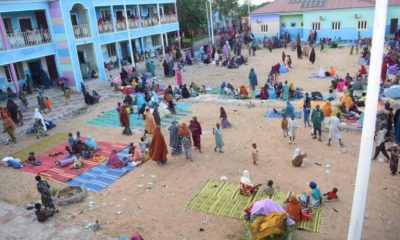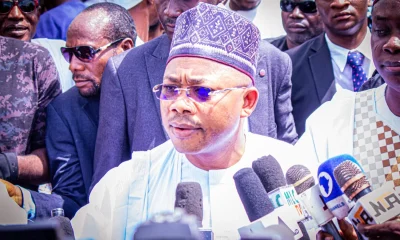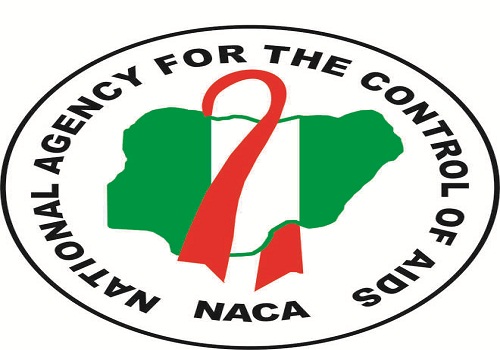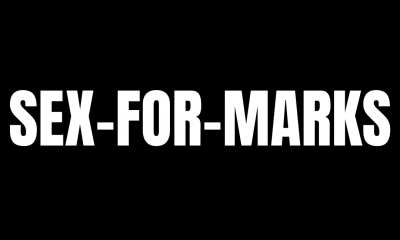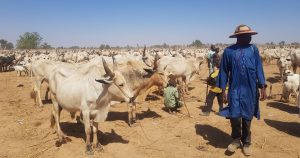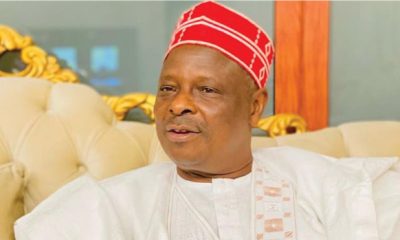NEWS
Lagos Begins ”20 Saturdays” Fresh Food Fair
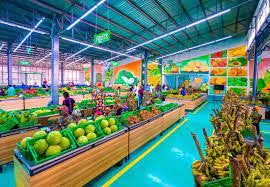
The Lagos State Government, through its Ministry of Agriculture, on Saturday started a ”20 Saturdays” Fresh Food Fair, at the newly constructed Agro Produce Hub at Idi-Oro in the Mushin area.
The food hub was established by the Babajide Sanwo-Olu administration as one of the direct answers to food insecurity and sustainability plaguing the country.
The hub was busy with business activities on Saturday as farmers and consumers participated actively in the fair.
Speaking during the fair, Mr Dapo Olakulehin, the General Manager, Lagos State Coconut Development Authority, said that the state government had created an enabling environment and good market for farmers to sell their produce through the fresh food fair.
Olakulehin, while assuring the public of quality control, said that there were agriculture officers attached to all the value chains, who do the quality control of all the products on display at the fair.
He said that the idea of the fair was to bring the farmers who are producing different fresh products in Lagos State to display their agricultural produce.
According to him, the fair will improve the economy of the people.
”As a Lagosian, if you buy something costing between N2,000 to N50,000 at the fair using a MoMo account, you get a 10 per cent discount. That is empowerment to the citizens in general.
”If you buy 25kg rice at N26,500, you will get a 10 per cent discount if you pay with a MoMo account immediately. The same thing goes for all the items.
”We have created an enabling environment and a good market for our farmers to sell their produce through the fresh food fair. The money is being circulated in Lagos; you produce in Lagos and sell in Lagos. That is the idea.
”This fair will be coming up for the next 20 Saturdays; every Saturday till the end of July. Today is the first day; next week Saturday, farmers will also be here,” he said.
Olakulehin called on farmers in Lagos State to see the fair as a golden opportunity, hence, they should participate.
He urged them to get in touch with the Ministry of Agriculture on how to participate in the fair, so they could bring out their fresh products for display and purchase by residents.
The general manager added that the 20 Saturdays fair would help the public to know that Lagos also produces fresh agricultural produce.
”And because of the 10 per cent discount for the consumers, the farmers are sure that people will buy the products they display,” he said.
At the food fair, farmers and consumers commended the government for the initiative, saying that it will improve farmers’ productivity, and provide the opportunity for Lagos residents to have access to fresh farm produce.
Mrs Chinaza Asonye, who is a rice, fish, poultry and mushroom farmer, said that the hub provided an opportunity for farmers in Lagos State to showcase what they had been farming in the state.
”The market will be held every Saturday from today and you can rest assured that you will get all the produce you want to buy here. You will buy at an affordable price because it is from the farm gate at farmers’ price and not from a middle man.
”Whatever you are buying here, you will be sure that you are buying a profitable product. People have been patronising us. This is a beautiful venture for farmers in Lagos State,” Asonye said.
She said that what the government had done would give the farmers a big relief that whatever one wanted to farm in Lagos State would be bought by consumers.
Also speaking, a trader from Mile 2 International Market, Mr Mukaila Saliu, described the hub as a new market.
”We came here to sell our goods. We have tomatoes, various peppers – rodo, bawa; garlic, irish potato and carrot. We brought many farm produce here.
“This place is very good and we want more people to join us in patronising this market.
”This shows that we have a government that can assist us in improving our market. We really appreciate Gov. Babajide Sanwo-Olu,” Saliu said.
A businesswoman and consumer, Mrs Judith Ebun, who bought farm produce during the food fair expressed her satisfaction.
”Someone told me to come for the fresh food fair and I decided to come in to see what is happening here. Getting here, I loved what I saw.
”I have bought enough onions and tomatoes. I also bought a bag of rice and ororo (vegetable oil).
“I love the things I bought and the prices are nice. They are really subsidised. The government is trying. This is a good initiative,” she said.
Also speaking, the General Secretary, Poultry Association in Lagos State, Mr Foluso Adams, expressed his satisfaction with the food hub and urged the state government to build more hubs in different parts of the state.
Adams said that the fair was a good concept that other states could tap into because it would improve commerce.
”Farmers are being encouraged by sales of their produce, one way or the other. There is a good car park and security. The environment is serene and peaceful. It is what we want.
”They should not make it only this place alone. Lagos is very big; government should build another food hub in Badagry, Epe and other localities.
“This will ensure that more farmers and consumers benefit from agricultural programmes like this,” he said. (NAN)
NEWS
Adamawa Health Supply Management Agency Revolutionizes Drug Procurement

From Yagana Ali, Yola
The Adamawa State Health Supply Management Agency has introduced sweeping reforms in the state’s healthcare delivery system, ensuring an uninterrupted supply of quality medicines to health facilities across the state.The agency’s Executive Secretary, Dauda Deri disclosed that the new system allows the state to procure drugs directly from certified pharmaceutical manufacturers, cutting out middlemen and guaranteeing quality, safety and affordability.
The new system enables the state to receive supplies directly from manufacturers, ensuring that every batch of drugs can be traced and any problems swiftly addressed.This development is a significant step towards eliminating substandard medications and improving the overall quality of healthcare in the state.Deri emphasized that the centralization of drug procurement with reliable data has not only improved efficiency but also reduced costs, making medicines more affordable for both the poor and the general public. Governor Fintiri’s prioritization of healthcare has been instrumental to the agency’s success, and the state’s swift establishment of the Health Supply Management Agency has been recognized nationally.The agency’s recapitalization has also revitalized the pharmacy profession in the state, with pharmacists who previously left the state for better opportunities returning to Adamawa. The government has provided all necessary working tools, encouraging pharmacists to join the civil service.With newly built hospitals, upgraded facilities, and a steady supply of quality drugs, the Adamawa State Health Supply Management Agency is setting a new standard for healthcare delivery in the region. The agency’s efforts are expected to improve the health and well-being of the people of Adamawa State, and its success serves as a model for other states in Nigeria.NEWS
AFRO Awards 2025: Film Director Lauds Philanthropists, Organizations on Humanitarian Services
From Joseph Amedu, Lokoja
A US based Film Director, Taiwo Oduala has commended the unprecedented achievements and humanitarian services being rendered to the less privileged by philanthropists and corporate organisations.Oduala gave the commendation while speaking with newsmen on Monday in Lokoja.
The Nigerian born film director, who hosts the Afro Awards in Los Angeles, America, said life is all about service to God and humanity, no matter how low or highly placed in the society. He said that the love for mankind that some individuals and organizations are displaying across the globe gave birth to the Afro Awards four years ago.The founder and executive producer of the Afro Awards, said the awards were solely aimed to recognize and honor individuals, who have demonstrated exceptional humanitarian excellence in various fields.”The first event was held on Nov. 6, 2022, at Regal La Live, 1000 W Olympic Blvd, Los Angeles, California and hopefully by Oct. 24, we shall be holding the 4th edition of the award.”The Afro Awards has hosted and honored over 5,000 individuals since its inception, recognizing their contributions to humanitarianism and philanthropy in American and African communities alike,” he said.According to him, the 2025 event promises an unforgettable evening of glitz, glamour, and powerful recognition of individuals who have made outstanding contributions to humanity, leadership, arts, entertainment, and global excellence.He added, “AFRO Awards is an international celebration dedicated to honoring the achievements of individuals and organizations that exemplify humanitarian values and excellence in their respective fields.”Looking at the past honorees including global icons, philanthropists, and change-makers, we believe the AFRO awards will continue to stand as a symbol of unity, inspiration, and cultural pride.”NEWS
Kogi Monarch Hails Ododo’s Leadership Style, Promises Peace Maintenance

From Joseph Amedu, Lokoja
His Royal Majesty, Oba Johnson Kolade Otitoju, the Akinrin of Ekinrin in Ijumu Local Government Area of Kogi state has commended Governor Usman Ododo’s Leadership Style with a promise to complement government’s efforts in maintaining peace and order in his domain.
He said Governor Ododo’s administration has been impactful and demonstrated a high level of human face leadership capacity. His Royal Majesty gave the commendation while speaking at the one-year anniversary of his receipt of the staff of office as a first-class traditional ruler.”One year ago, the Akinrin of Ekinrin was honored with the staff of office by Governor Usman Ododo during a colorful ceremony attended by a large crowd at the Kogi State Government House’s Glass House in Lokoja, Kogi State. Myself and my subjects remain eternally grateful to the Governor and will continue to be solidly behind your people-oriented administration”When God says yes, no individual or group can say no. I, Oba Johnson Kolade Otitoju, the Akinrin of Ekinrin, am profoundly grateful to God for this gesture. On behalf of the Ekinrin community in Ekinrin-Adde, I also extend my gratitude to the former Governor of Kogi State, Alhaji Yahaya Bello, for elevating the Ekinrin throne to its first-class status.”The two significant events—the grading of the stool and the presentation of the staff of office—are truly memorable. To God be the glory.”I would like to thank all the friends of Akinrin and the Ekinrin community, both in Ekinrin-Adde and beyond, who have congratulated Oba Akinrin and the Ekinrin community. Thank you, good people!”Let me reiterate what I often say: our unity is not only our strength; it is also our path to progress and the ultimate reason we are here. I encourage all of you to love one another, for God is love. Congratulations to everyone in Ekinrin-Adde”
